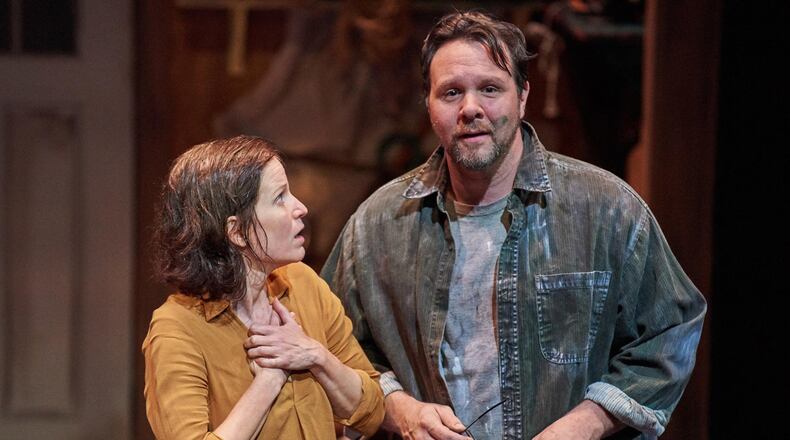Possibly befitting the play's heroine, a stockroom clerk who packs and ships presumably valuable Tibetan-oriented knickknacks that are actually mass-manufactured in China, there's something oddly fabricated and inauthentic about "Be Here Now," a pseudo-spiritual romantic comedy-drama by Deborah Zoe Laufer.
Aurora Theatre’s production, blandly staged by director Rachel Parish, casts Cynthia Barrett as Bari, a so-called “liberal elitist” and former college professor of nihilism. After nine years, she’s still struggling to finish writing her thesis about the nothingness of life — while wasting away in a dead-end job with a prattling pair of friends (Falashay Pearson, Joselin Reyes) into astrology, meditation, yoga and sexting (if not also mood-enhancing drugs, Bari cynically speculates).
Given Bari’s “smug gloom” and lack of sex drive, what she really needs, her comic-relief co-workers think, is a date. So they arrange for Bari to meet Mike, a soul-searching free spirit who creatively repurposes found objects. He’s played by Travis Smith, who’s among just a handful of performers in town capable of projecting charm, warmth and likability by simply showing up.
Never mind Bari’s pessimistic attitude and outlook, or her off-putting demeanor and behavior. When he witnesses one of the recurring seizures she’s been having lately — marked by ringing in her ears, colorful hallucinations and sudden blackouts — it’s Mike who (rightly) suggests Bari needs to have her head examined, literally.
There’s only so much Barrett can convey with big awestruck facial expressions. Based on what I saw opening weekend, those sequences depicting Bari’s fantastical spells, which ought to stand apart stylistically from all of the play’s other scenes of forced reality, are generally indistinguishable from them instead.
(The lackluster lighting is credited to Maranda DeBusk. And another thing on the design front: Maybe I’m slipping, because the 105-minute one-act was virtually over before I even noticed director Parish’s faint use of projections on either side of the stage. A nice but fleeting touch, though: Rain trickling down a back wall of designers Isabel and Moriah Curley-Clay’s set.)
Barrett’s performance fluctuates wildly and uncomfortably between the contrived comedic and dramatic demands imposed on her by the script — not especially sympathetic in terms of grappling with Bari’s dour skepticism about life, or entirely convincing portraying the giddy and uninhibited symptoms of her rare medical condition. She’s eventually diagnosed with a form of epilepsy called Geschwind syndrome, and a brain tumor on top of that.
So enamored is Bari of her newfound lust for life — or at least for Mike — that one of the larger issues she confronts is whether or not to treat that tumor at all. But not even the little details add up very plausibly in the grand scheme of “Be Here Now.” (Spoiler alert No. 1: She finally undergoes a drastic surgical procedure without sacrificing her full head of hair.)
In a seemingly trifling but ultimately infuriating scene near the end of the play, as if they’d never heard of dialing 911, Laufer’s four characters frantically try to figure out how to get Bari from upstate New York to a hospital in Manhattan. (Spoiler alert No. 2: Mike hasn’t ridden in a car, let alone driven one, since a tragic accident from years earlier that resulted in numerous deaths.)
All of them are ostensibly aware of Mike’s sad back story, so it’s hard to say which is the more utterly inconceivable: that one of the co-workers would mindlessly quip (not once but twice), “I can’t drive to the city. I’d kill us all!” — or that not one of the others would bat an eye or otherwise react to that in the slightest way.
THEATER REVIEW
“Be Here Now”
Through Oct. 21. 8 p.m. Tuesdays-Saturdays; 2:30 p.m. Saturdays-Sundays; 10 a.m. Tuesday (Oct. 2 only). $20-$55. Aurora Theatre, 128 E. Pike St., Lawrenceville. 678-226-6222, auroratheatre.com.
Bottom line: Overly phony.
IN OTHER NEWS:
About the Author
Keep Reading
The Latest
Featured



